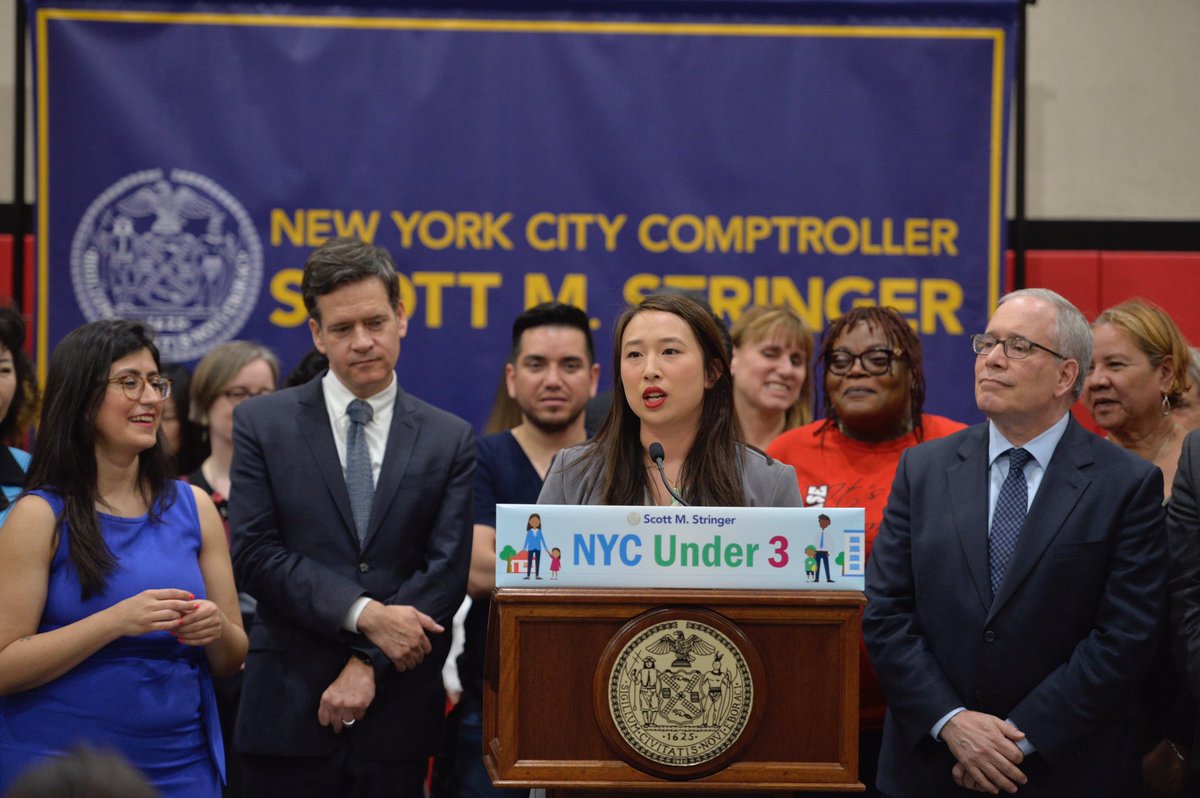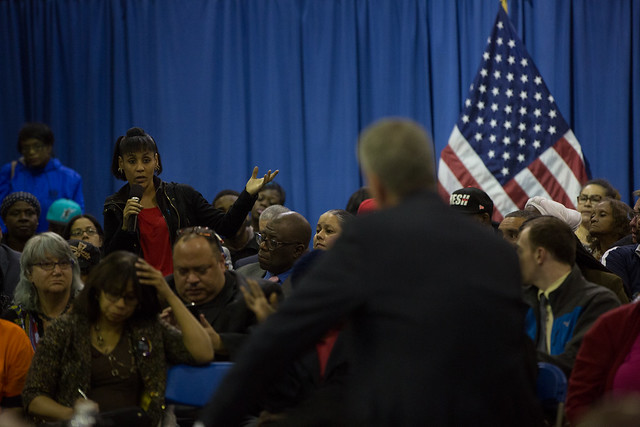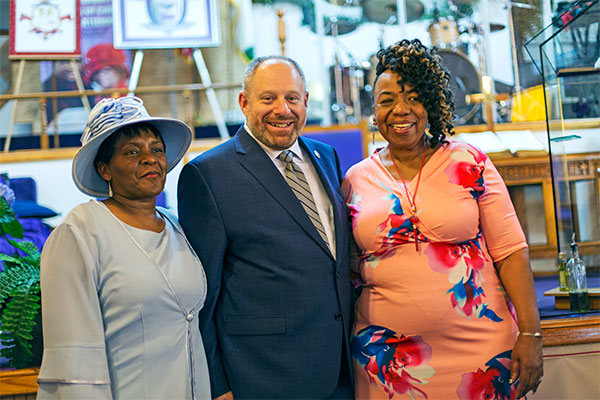Our Work on Public Campaign Financing is Not Done

the authors: Assemblymember Niou, center, & Senator Ramos, left (photo: @NYCComptroller)
We’ve got a big money problem here in New York, and we hear loud and clear the New Yorkers who are calling for a small donor solution in the form of public financing of elections.
Public financing became a top issue in state budget negotiations earlier this year because of public demand. The plan for a commission to now determine the parameters of public financing of elections was placed in a large budget bill in the final hours of budget negotiations, making it nearly impossible to oppose as legislators.
But we must introduce and move public financing of elections bills this legislative session -- before it ends June 19 -- to fix, or overturn, a weak commission result. We’re committed to ensuring that we end this year with a strong public financing program in New York, whether via commission, legislation, or a combination of both.
It’s important to push this issue ahead and not simply allow the commission to unfold without additional legislation for several reasons.
As women of color and as elected leaders representing people from all walks of life, we are here to bring change and shift power away from big donors and to the people of New York.
Our elections are currently dominated by a tiny number of big donors. According to the Brennan Center for Justice, just 100 donors outspent all the 137,000 small donors combined last year. It’s time for regular constituents to get their say through a 6-to-1 small donor match, lifting the voices of everyday New Yorkers and fundamentally changing the way politicians fundraise by allowing them to focus on those who may only give $20.
Those who oppose reform point to the price tag with a high estimate of $100 million per year (a small fraction of one percent of our state’s budget) as an excuse to avoid changing the status quo. They say we can’t afford it. You know what costs more? Corruption.
When elected leaders are forced to spend their time rubbing shoulders with big donors—who tend to be predominantly corporate donors—we end up with expensive, unnecessary, out-of-touch policies that hurt the rest of us. We also shut out people with a desire to serve their communities but without connections to big donors from running for office. These systematic barriers block women and people of color—in particular women of color—from running and winning public office.
Following damaging decisions by the Supreme Court that now allow unlimited money into our elections, public financing of elections is the only real way to counter the corrosive influence of super PACs—and we have a chance to show the nation how to get it done.
In Connecticut, after a small donor public financing system was put in place, lawmakers moved forward policies to end corporate giveaways and pushed ahead issues that are meaningful to communities of color and other underrepresented communities.
Once public financing was in place, leaders passed mandatory paid sick days, increased the minimum wage, instituted in-state tuition for undocumented students, and helped low-income and working individuals and families by adopting an Earned Income Tax Credit.
In another illustrative example, they also ended the practice of returning unclaimed bottle deposits to the beverage industry. The influence of beer and soda distributors long kept this giveaway worth up to $24 million annually in place. Now the money can be redirected to important public programs.
To ensure a similar result—a democracy that is not beholden to wealthy special interests and instead is responsive to the needs of constituents—in New York, we must ensure a strong Public Financing and Elections Commission that gets to work soon with diverse and credible commissioners to hold transparent proceedings with ample room for public input.
As lawmakers, we have to be prepared for the possibility of a weak commission result. Our responsibility does not end with appointing commissioners. It’s our duty to ensure a strong public financing program, and that means having legislation ready should we need to improve upon the commission’s recommendations.
Our mission is clear. We must deliver a strong small donor public financing program by the end of the year to shift power to the people of New York and away from big donors. We’ve come too far to settle for anything less.
***
State Senator Jessica Ramos represents parts of Queens. Assemblymember Yuh-Line Niou represents parts of Manhattan. On Twitter @jessicaramos & @yuhline.
***
Have an op-ed idea or submission for Gotham Gazette? Email This email address is being protected from spambots. You need JavaScript enabled to view it.
Including Community Voices - and Services - as We Close Rikers and Build New Jails

(photo: Michael Appleton/Mayoral Photography Office)
If you would have told New Yorkers seven years ago that the jails on Rikers Island would be closing, they would have not believed you.
Until recently, shutting down the infamous complex was roundly dismissed as a radical idea that was not likely to be achieved during our lifetimes. However, what was once a dream for many people is now closer to becoming reality due to the hard work of brave New York City advocates and a number of forward-thinking organizations who have worked tirelessly to shed light on the principal concerns that fueled the Close Rikers campaign.
We must continue to fight for the decarceration of New Yorkers by demanding bail reform and alternatives to incarceration for all who are awaiting trial or are sentenced to one year or less in our jails. Over the last year, community conversations about the plan to close Rikers jails have shifted to a debate about the location and heights of the new community facilities that will replace the jails on Rikers. As we continue listening and creating a dialogue with our neighbors, we cannot lose sight of our collective mission: to build a more humane justice system.
The question we must ask is: how can any new facility and its surroundings reflect who we are as a community?
Research on reducing recidivism and incarceration stresses the importance of a multi-faceted approach. Strengthening social ties through community programming, improving economic opportunity through job training and quality education, and expanding access to quality housing and healthcare all contribute to better outcomes for at-risk populations.
I know firsthand how important these programs are to help change lives and communities as a whole. In Mott Haven in the Bronx, the community I call home, I am part of a community-based organization that stresses the importance of education, civic participation, and economic development to people of all ages.
I have led educational programs, life-skills development trainings, and individualized support to get at-risk youth back on the right track. In fact, three young people who were once labeled at-risk and disconnected youth used these programs as an opportunity to redefine themselves into successful young adults who now give back to their community, and I later hired each of them as program directors. They have become some of Mott Haven’s most vocal community leaders.
In the coming years, advocating for these programs will become critically important to overhauling a status quo that simply has not been working.
Additionally, according to the Independent Commission on New York City Criminal Justice and Incarceration Reform, New York City will save over $1.6 billion annually if the jails on Rikers close and a modern, smaller system replaces them. Our communities will need to decide how that money is spent.
Advocates must push to have savings from the closure of the Rikers jails reinvested back into the communities that have historically shouldered the cost of our unjust legal system. As the city looks to place jails in areas like Mott Haven, near my home in the Bronx, we must ensure that these projects include services and resources that have a positive effect on the community and reduce the incarcerated population. As a Bronx Neighborhood Advisory Committee member, this is exactly what I and other members have been advocating for as we advise city government on how to proceed.
The Bronx Neighborhood Advisory Committee is a diverse group of committed and dedicated Bronx residents who have been working diligently to secure true sustained investment in the Mott Haven community. We have spent months developing recommendations focused on improving quality of life by ensuring that our neighborhood receives services and investments in the areas of health, recreation, economic development, education, and housing.
Some of these recommendations include building affordable housing for Bronx residents, investing in youth by upgrading community centers in the surrounding areas and providing programming, and providing healthy food options for the residents of Mott Haven while also educating the community on healthy food practices to transform Mott Haven from a food desert into a healthy food oasis.
Doing so will help make our children more healthy and give them a real shot at success in the future while also giving Bronx community members an opportunity to participate in our economy, establish businesses, and help our community flourish.
As the city continues to seek community input on plans to open more humane jails in our neighborhoods, not only do we have an opportunity to bring real investments in our community, but the chance to be on the right side of history. We have an opportunity to fundamentally change our justice system and take a significant step toward ending the era of mass incarceration.
***
Althea Stevens is a Mott Haven community member and part of the Neighborhood Advisory Council, which has advised the city on its borough-based jails plan.
***
Have an op-ed idea or submission for Gotham Gazette? Email This email address is being protected from spambots. You need JavaScript enabled to view it.
Ensuring Others Don’t Face the Injustice I Did: Why Rory Lancman is the Right Candidate for Queens DA

Valerie Bell, the author, left; Rory Lancman; and Gwen Carr
On November 25, 2006, my son Sean Bell was killed in a hail of 50 bullets from the NYPD on his wedding day. The officers who killed my son were acquitted due to the lack of an unbiased relationship between the judge and the Queens district attorney. Sean never received the justice he deserved and the men that murdered my son suffered no consequences under the law.
Subsequent to this marred process of criminal justice, I worked diligently alongside other mothers who were victims of police brutality to request Governor Cuomo use his authority under the law to appoint a Special Prosecutor in the Attorney General's office to investigate police use of deadly force. The governor supported our view and a Special Prosecutor was granted.
Since meeting City Council Member Rory Lancman, I’ve learned he has always been in relentless pursuit of police accountability. He has been, and continues to be a guardian against the racial disparities of law enforcement in communities of color, and this is why I am supporting Rory Lancman to be the next District Attorney in Queens.
As I have seen firsthand, criminal justice in Queens is stuck in the past, but for the first time in almost 30 years, the people of Queens have the power to elect a new District Attorney. The current Queens DA's office led the opposition to creating a Prosecutorial Misconduct Commission, and is the only DA's office in New York City that refuses to have a wrongful conviction review unit.
The office has opposed closing Rikers Island, and refuses to follow the lead of other District Attorneys who no longer prosecute most fare evasion and marijuana possession cases; 90% of such prosecutions are people of color. Queens’ 2.3 million people deserve better than a 'lock ‘em up and throw away the key' mentality.
For these reasons and more, Rory Lancman needs to be the next District Attorney in Queens.
Rory understands that our criminal justice system is built on a foundation of institutional racism. That racism manifests itself in a number of ways: massive discrepancies in communities of color for low-level arrests, broken windows policing that terrorizes black and brown communities, and a system that sets up even innocent people to plead guilty rather than endure the nightmare of Rikers Island while waiting for their day in court.
My family never received justice for what happened to Sean. Gwen Carr and her family never received justice for what happened to Eric Garner. Instead of just lamenting problems, Rory has gotten to work. He’s sponsored legislation that would outlaw police chokeholds, and has fought against the misuse of New York's so-called “50-A Law” to shield police officers from public scrutiny of prior misconduct. As our next Queens District Attorney, Rory will not tolerate police malfeasance, whether it is violence against law-abiding citizens or perjury in the courtroom.
Finally, Rory will be a true criminal justice reformer at a time when Queens desperately needs it. Rory’s vision is simple: create a fair system that treats everyone equally, and that views incarceration as a last resort for real crimes. Too many of our young people are given criminal records for the rest of their lives that make it hard for them to get an education, job, and housing.
On June 25, Queens will face a stark choice in choosing a new District Attorney. The District Attorney has incredible power over people's lives. Queens is long overdue for a true reformer who will make sure the law works for everyone, and will hold even the powerful accountable. That person is Rory Lancman.
***
Valerie Bell is the mother of Sean Bell.
***
Have an op-ed idea or submission for Gotham Gazette? Email This email address is being protected from spambots. You need JavaScript enabled to view it.




